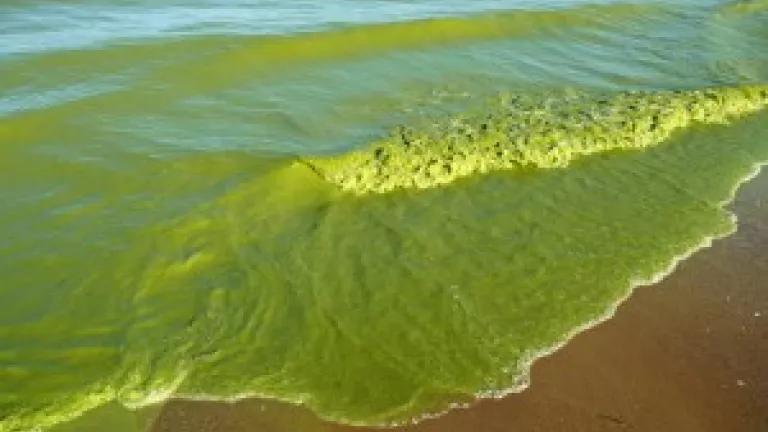Des Moines versus Goliath: drinking water supplier tired of paying for algae mess it didn't make

EPA has thus far shown no backbone in addressing the algae pollution plaguing the nation, but at least one victim of that crisis is responding like a vertebrate. The Des Moines Water Works, sick and tired of paying for costly treatments to remove toxic nitrates from its water supply system, is striking back against the largely unregulated agricultural pollution that's partly responsible. Last month, the Water Works sent a 60-day notice of intent to sue to the drainage districts who manage the flow of agricultural nitrogen and phosphorus - or "nutrients" - that ends up in the city's drinking water source.
It was a matter of time, really. There is only so long we can continue our collective head-in-the-sand response to the nation's nutrient pollution crisis before those shelling out money to deal with the problem start asking the responsible parties to foot the bill. Our nation's plague of nutrient-fueled green slime is not just an assault on our senses, but an assault on our collective pocketbooks. Nutrient pollution has been estimated to cost the country $4.3 billion annually, a cost paid by the fishing industry, the tourism industry - and the water supply entities forced to pay for expensive solutions to keep the potable water flowing. Des Moines Water Works recounts in its notice letter spending $4.1 million to build a nitrate removal facility, which costs $7,000 a day to operate. And let's not forget Toledo, which lost its water supply entirely for 3 days last summer when the mats of green algae choking western Lake Erie collided with its drinking water intake and spiked the levels of algal toxins to dangerous levels. Toledo has doubled its water treatment budget in recent years, to $4 million annually, in response to the problem.

The agricultural pollution at which the Des Moines lawsuit takes aim is largely exempt from direct regulation under the federal Clean Water Act requirements that apply to other sources of pollution. "Point sources" - meaning pipes and other conduits of pollution to surface waters - are strictly prohibited from discharging without a permit, and the permits must ensure that the discharge does not cause a violation of water quality standards. Agricultural runoff, on the other hand, is exempt from Clean Water Act permitting requirements. The notice letter argues that the network of drain pipes managed by the defendant drainage districts are point sources, and hence that the nutrient-laden water that flows through them does not qualify for the agricultural runoff exemption and is subject to permitting requirements.
So we can cheer on the scrappy Water Works for taking on the
goliath agricultural industry. But we should also remember that litigation is a last resort, the tool you use when every other tool is broken. That, sadly, is the state we're in with nutrient pollution, but it doesn't have to be that way. EPA has the tools at its disposal to tackle the problem in a sensible, comprehensive manner. Yet it refuses to use them, shrinking before the power of the agricultural industry that Des Moines is bravely standing up to. As we have said numerous times in this space, EPA could develop federal numeric water quality standards for nutrients where states have not (and most of them have not), which would enable strict point source limits and create the firm benchmarks necessary to address agricultural pollution. Yet we have had to force the Agency in litigation to even respond to our question whether that step is necessary.
But as Des Moines' lawsuit reminds us, ignoring costs does not make them go away. The nutrient crisis is huge and pervasive and getting more so, as climate change warms our waters and increases the frequency and severity of harmful algal blooms. Someone is going to have to pay the bill for this. And we can't blame Des Moines for wanting that someone to be an industry that has been running up the tab.
Photos: sustainablewater.org, US EPA

